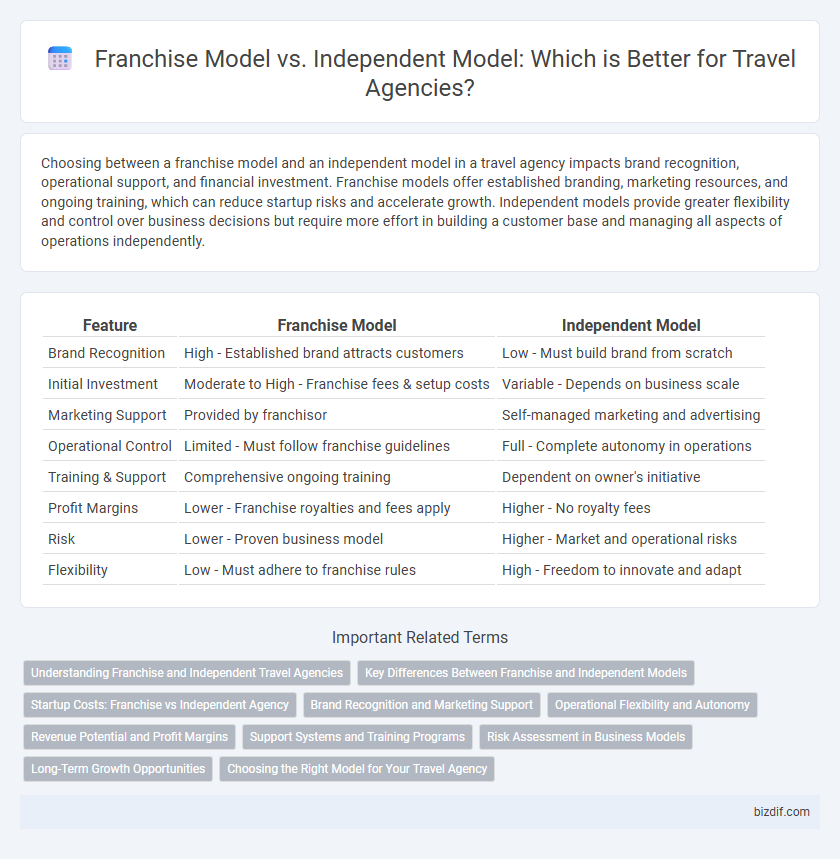Choosing between a franchise model and an independent model in a travel agency impacts brand recognition, operational support, and financial investment. Franchise models offer established branding, marketing resources, and ongoing training, which can reduce startup risks and accelerate growth. Independent models provide greater flexibility and control over business decisions but require more effort in building a customer base and managing all aspects of operations independently.
Table of Comparison
| Feature | Franchise Model | Independent Model |
|---|---|---|
| Brand Recognition | High - Established brand attracts customers | Low - Must build brand from scratch |
| Initial Investment | Moderate to High - Franchise fees & setup costs | Variable - Depends on business scale |
| Marketing Support | Provided by franchisor | Self-managed marketing and advertising |
| Operational Control | Limited - Must follow franchise guidelines | Full - Complete autonomy in operations |
| Training & Support | Comprehensive ongoing training | Dependent on owner's initiative |
| Profit Margins | Lower - Franchise royalties and fees apply | Higher - No royalty fees |
| Risk | Lower - Proven business model | Higher - Market and operational risks |
| Flexibility | Low - Must adhere to franchise rules | High - Freedom to innovate and adapt |
Understanding Franchise and Independent Travel Agencies
Franchise travel agencies operate under a recognized brand and benefit from established marketing, booking systems, and supplier relationships, which can lead to increased customer trust and streamlined operations. Independent travel agencies maintain full control over their business decisions, allowing for personalized service and flexible offerings, but they face challenges in brand recognition and negotiating competitive supplier rates. Choosing between these models depends on priorities such as brand affiliation, operational autonomy, and resource availability for marketing and technology investments.
Key Differences Between Franchise and Independent Models
Franchise travel agencies operate under a recognized brand with established marketing, training, and support systems, providing consistency and reduced startup risk, while independent agencies offer complete control over business decisions, branding, and service customization but face higher operational challenges. Franchise models often require franchise fees and adherence to corporate policies, whereas independent agencies enjoy greater flexibility but bear full responsibility for marketing, supplier negotiations, and customer acquisition. The choice between franchise and independent models impacts scalability, brand reputation leverage, and financial investment in the competitive travel industry.
Startup Costs: Franchise vs Independent Agency
Startup costs for a travel agency franchise typically include franchise fees, marketing contributions, and training expenses, often ranging from $10,000 to $50,000. Independent travel agencies generally face lower initial expenses but must invest heavily in brand development, technology, and operational setup, which can exceed $20,000 depending on location and services. Franchises benefit from established brand recognition and turnkey systems, reducing financial risk compared to independent agencies that bear full responsibility for market entry and infrastructure.
Brand Recognition and Marketing Support
The franchise model offers strong brand recognition and extensive marketing support, leveraging established reputations and centralized advertising campaigns that drive customer trust and engagement. Independent travel agencies often face challenges in building brand awareness and must invest significantly in their own marketing efforts to compete. Franchise partners benefit from proven marketing strategies, promotional materials, and national advertising networks, which help accelerate business growth and attract a wider customer base.
Operational Flexibility and Autonomy
The franchise model offers structured operational guidelines and brand consistency, which can limit flexibility but ensures standardized service quality across locations. In contrast, the independent model provides greater operational autonomy, allowing travel agencies to tailor services, pricing, and marketing strategies to local market demands. This enhanced flexibility enables quicker adaptation to industry trends and customer preferences without corporate constraints.
Revenue Potential and Profit Margins
The franchise model in travel agencies offers higher revenue potential due to established brand recognition and access to centralized marketing resources, which attracts a larger customer base. Profit margins in franchise models tend to be more stable but can be reduced by royalty fees and franchise costs, whereas independent travel agencies have greater control over pricing and operational expenses, potentially leading to higher profit margins. Independent agencies benefit from flexibility in service offerings and niche market targeting, which can drive unique revenue streams not available to franchise operators.
Support Systems and Training Programs
Franchise travel agencies benefit from comprehensive support systems and structured training programs provided by the parent company, ensuring consistent service quality and updated industry knowledge. Independent travel agencies often rely on self-directed learning and third-party resources, which can lead to varied levels of expertise and operational efficiency. Access to robust support and ongoing training in franchise models enhances business scalability and customer satisfaction.
Risk Assessment in Business Models
Franchise models in travel agencies offer reduced financial risk due to established brand recognition, proven business systems, and ongoing corporate support that mitigates operational uncertainties. Independent models, while providing greater autonomy and flexibility, carry higher risks from market volatility, lack of brand trust, and the responsibility of developing proprietary marketing and operational strategies. Comprehensive risk assessment should evaluate factors like capital investment, brand equity, regulatory compliance, and scalability potential to determine the optimal business model for stability and growth.
Long-Term Growth Opportunities
The franchise model offers structured support and brand recognition, enhancing long-term growth opportunities through established marketing channels and operational frameworks. Independent travel agencies benefit from greater flexibility and unique brand identity, allowing for tailored customer experiences that can drive sustainable growth. Strategic investment in technology and customer service is essential for both models to maximize long-term profitability and market expansion.
Choosing the Right Model for Your Travel Agency
Selecting the optimal business structure for your travel agency hinges on weighing the franchise model against the independent model. Franchise models offer established brand recognition, marketing support, and access to global booking systems, which can accelerate growth and customer trust. Independent travel agencies provide flexibility in service offerings and pricing but require stronger self-driven marketing and operational management to compete effectively.
Franchise model vs Independent model Infographic

 bizdif.com
bizdif.com